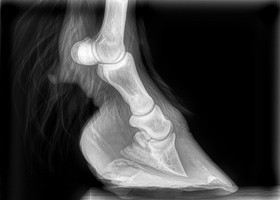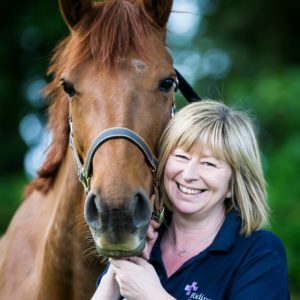Spring is well and truly here and with it we have seen a spike in emergency call outs. This happens every year but the type of emergencies vary depending on the weather and include foalings, colic, laminitis, wounds, lameness, eye injuries and many more. This year in particular we are seeing a higher than average number of laminitis and colic cases. Here's my thoughts on why we see these conditions more in the spring and what you can do to prevent them.
Spring Grass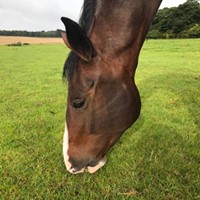
Spring time means that grass starts growing faster than any other time of year. During spring the levels of fructans, a type of sugar and non structural carbohydrates in grass are very high. They are highest in stressed pastures, especially ones that have been grazed over winter and not rested and pasture with high stocking densities.
The levels of fructans in the grass rises during the day peaking in the afternoon. Fructans are used as fuel for the grass to grow overnight. When the nights are cold as they have been recently the grass doesn't grow and the fructans get stored in the blades of grass. Thus warm days and cold nights of spring result in very high levels of fructans.
Horse digestion
The horses intestines can't digest fructans or non structural carbohydrates found in grass, they rely on the billions of microbes that live in the horses large intestines to break them down. The balance of microbes in the horses intestine is very delicate. Different types of food require different microbes for breakdown so every time the horses diet changes the microbes need to adapt to the new diet.
When horses start ingesting large quantities of spring grass the balance of microbes is disturbed and they are unable to digest the grass leading to fermentation in the large intestines. This then produces lactic acid, harmful bacteria and gas within the intestines. This can lead to colic or laminitis. Of course some horses are more sensitive to these effects than others.
Colic
Colic in horses just means abdominal pain and can have a number of different causes. In spring we see more cases of spasmodic or gas colic than any other time of year.
When gas is produced in the intestines due to an excessive amount of grass high in fructans and non structural carbohydrates the gas can become trapped in pockets. Due to the length of the horses intestines and the loops the gas may struggle to escape and cause the gut wall to stretch and become painful leading to signs of colic.
Laminitis
Spring laminitis is much like the laminitis we see at other times of year and related to the diet. We see more laminitis in spring because of the sudden increase in sugars from grass in the horses diet leading to an increase in the blood glucose levels and insulin. This can lead to equine metabolic syndrome in some horses.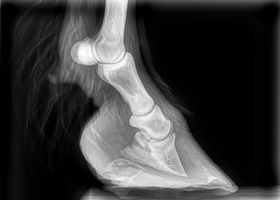
Although the exact mechanism is unclear we know that increases in blood glucose and blood insulin can have a negative impact on the horse's laminae in the feet causing laminitis.
Prevention
-
Increase turn out very gradually for horses that have not been on grass or minimal grass over winter starting with 1 hour a day.
-
For horses that live out reduce the time spent on grass by stabling them for part of the day.
-
Consider strip grazing to reduce the amount of grass that can be eaten.
-
Even if you think the paddock is bare, it isn't! There will be tiny shoots of sugar rich grass coming through.
-
Feeding a pro-biotic supplement will help the horses gut microbes remain in balance and reduce the risk of colic.
-
Monitor horses very closely for signs of laminitis, know how to find your horses digital pulse and check it every day.
-
Horses that have previously had laminitis should be kept off spring grass, no exceptions.
-
Overweight horses should have their grass intake restricted and be on a weight control program.
-
If your horse is over 15 years old get them tested for Equine Cushings Disease as this will increase their risk of developing laminitis.
Ridings Equine Vets have a weigh bridge which we encourage horse owners to come to have their horses weighed, we can also bring it to your yard if you have a group of you that would like to have your horses weight checked.
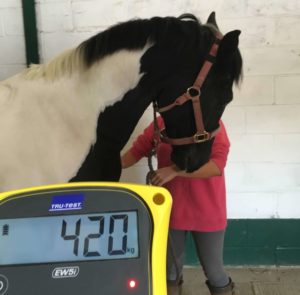
Rosie on the weighbridge
If you are worried about your horse's weight please talk to us about our weight control program.
Prevention really is better than cure, hopefully by reading this blog you can prevent us seeing your horse in an emergency situation this spring!
Jenny x
Equine Veterinary Surgeon

Charlie, Jenny and Clover
